 MPI Organisational Policy
Procurement Policy
Owner: Chief Financial Officer
Published: June 2020
MPI Organisational Policy
Procurement Policy
Owner: Chief Financial Officer
Published: June 2020
ACT 1982
INFORMATION
MPI Procurement Policy
RELEASED UNDER THE OFFICIAL
Organisational Policy (MPI Procurement)
June 2020
Page 1 of 15
 MPI Organisational Policy
Procurement Policy
Owner: Chief Financial Officer
Published: June 2020
OVERVIEW
MPI Organisational Policy
Procurement Policy
Owner: Chief Financial Officer
Published: June 2020
OVERVIEW
Procurement covers all aspects of the acquisition and delivery of goods or services, spanning the whole
contract life cycle from the identification of needs to the end of a service contract, or the end of the useful
life and subsequent disposal of an asset.
Purpose
ACT 1982
This MPI Procurement policy is designed to ensure that:
MPI meets its obligations to achieve Public Value through best practice procurement, as laid out in
the Government Procurement Rules (GPR) and Five Principles of Government Procurement
(Principles);
staff are aware of their obligations when planning, sourcing and managing procurement activity,
and there is a consistent practice across MPI;
appropriate agreements are entered into and managed to reduce legal, financial, health & safety,
security and reputational risk to MPI;
INFORMATION
MPI can create partnerships that enables New Zealand to be the most sustainable provider of high-
value food and primary products; and
MPI applies the
Principles,
GPR, Government Procurement Charter and other good practice
guidance to all procurement activity.
Context
This policy defines how the Ministry will meet its obligations to achieve Public Value through best practice
procurement, as laid out in the GPR, and the
Principles.
Public Value means achieving the best available result for New Zealand for the money spent. It includes
using all our resources effectively, economically, and responsibly, and taking into account:
1. The procurement’s contribution to the outcomes and results we are trying to achieve; and
2. Delivery of any Broader Outcomes we are trying to achieve (including social, environmental,
cultural, or economic benefits); and
3. The total costs and benefits of a procurement (total cost of ownership).
This includes selecting the most appropriate procurement process that is proportionate to the value, risk
and complexity of the procurement to help achieve Public Value.
RELEASED UNDER THE OFFICIAL
Organisational Policy (MPI Procurement)
June 2020
Page 2 of 15

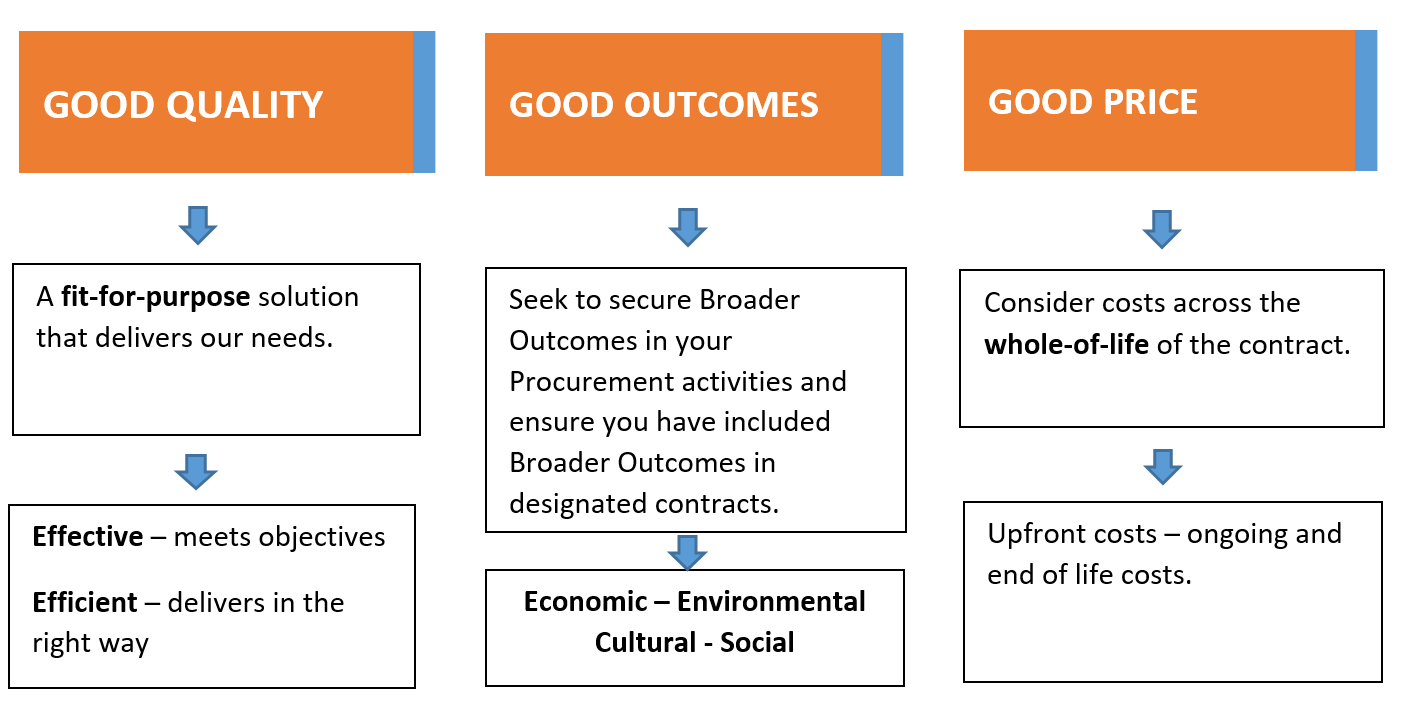 MPI Organisational Policy
Procurement Policy
Owner: Chief Financial Officer
Published: June 2020
MPI Organisational Policy
Procurement Policy
Owner: Chief Financial Officer
Published: June 2020
ACT 1982
INFORMATION
New Zealanders expect that public money and resources will be managed effectively and efficiently,
competently, and with integrity. MPI is reliant on external partners and service providers to support MPI to
deliver on our commitments to the Government and New Zealanders as a whole.
Principles and behaviours
The Ministry will conduct all procurement in accordance with the GPR, including the Principles and the
Government Procurement Charter. All procurement, commercial and supplier management activities must
comply with the Principles, no matter what the value of the external spend. The aim in applying these
principles is to ensure that the delivery of Public Value is a primary focus in all our procurement activity.
The Five Principles and their requisite behaviours and actions are:
Plan and manage for great results
Identify what you need, including what broader outcomes should be achieved, and then
plan how to get it;
Set up a team with the right mix of skills/experience;
Involve suppliers early – let them know what you want and keep talking to them throughout
the process;
Take the time to understand the market and your effect on it. Be open to new ideas and
RELEASED UNDER THE OFFICIAL
solutions;
Choose the right process – proportional to the size, complexity and any risks involved; and
Encourage e-business.
Be fair to all suppliers
Create competition and encourage capable suppliers to respond;
Organisational Policy (MPI Procurement)
June 2020
Page 3 of 15
 MPI Organisational Policy
Procurement Policy
Owner: Chief Financial Officer
Published: June 2020
MPI Organisational Policy
Procurement Policy
Owner: Chief Financial Officer
Published: June 2020
Treat all suppliers equally – don’t discriminate (this is part of our international obligations);
Seek opportunities to involve NZ businesses, including Maori, Pasifika and regional
businesses and social enterprises;
Make it easy for all suppliers (small and large) to do business with us;
Be open to subcontracting opportunities where this adds value;
Clearly explain how proposals will be assessed, so suppliers know what is important and
ACT 1982
what to focus on; and
Provide useful and constructive feedback to suppliers so they can learn and know how to
improve next time.
Get the right supplier
Be clear about what you need and fair in how you assess suppliers;
Choose the right supplier who can deliver what you need, at a fair price and on time;
Choose suppliers that comply with the Government’s Supplier Code of Conduct;
INFORMATION
Build demanding, but fair and productive, relationships with suppliers;
Make it worthwhile for suppliers; and
Identify relevant risks and get the right person to manage them.
Get the best deal for everyone
Get the best Public Value – account for all costs and benefits over the lifetime of the goods
and/or services;
Make balanced decisions – consider social, environmental, economic and cultural
outcomes that should be achieved;
Encourage and be receptive to new ideas and ways of doing things – don’t be too
prescriptive;
Have clear performance measures – monitor and manage to make sure you get great
results;
Work together with suppliers to make ongoing savings and improvements; and
It’s more than just agreeing the deal – be accountable for the results.
Play by the rules
Be accountable, transparent and reasonable;
Make sure everyone involved in the process acts responsibly, lawfully and with integrity;
RELEASED UNDER THE OFFICIAL
Stay impartial – identify and manage actual, perceived or potential conflicts of interest; and
Protect suppliers’ commercially sensitive information and intellectual property.
We will apply the Principles and the GPR when planning, sourcing and managing our procurement, as
these set the standard for good practice. By applying these principles sensibly, we can demonstrate that
we are spending public money carefully and that we are properly managing the process for spending it.
Organisational Policy (MPI Procurement)
June 2020
Page 4 of 15
 MPI Organisational Policy
Procurement Policy
Owner: Chief Financial Officer
Published: June 2020
The Government Procurement Charter
MPI Organisational Policy
Procurement Policy
Owner: Chief Financial Officer
Published: June 2020
The Government Procurement Charter directs us to:
Seek opportunities to include New Zealand Businesses. Openly work to create opportunities
for local businesses and small-to-medium enterprises to participate in the procurement processes;
Undertake initiatives to contribute to a low emissions economy and promote greater
environmental responsibility. Ensure that economic and social development can be
implemented on a sustainable basis with respect for the protection and prese vation of the
environment, reducing waste, carbon emissions and pollution;
ACT 1982
Look for new and innovative solutions. Making sure we don’t overp escribe the technical
requirements of a procurement, give businesses the opportunity to demonstrate their expertise and
be open to considering new methods of service delivery;
Engage with businesses with good employment practices. Ensure that the businesses we
contract with operate with integrity, transparency and accountability, and respect international
standards relating to human and labour rights. For businesses operating within New Zealand,
ensure that they comply with all New Zealand employment standards, health and safety
requirements, and privacy laws;
INFORMATION
Promote inclusive economic development within New Zealand. Engage with Maori, Pasifika,
and regional businesses and social enterprises in order to actively contribute to our local
economy. Openly work to include and support these businesses and enterprises through
procurement, we will promote both skills development and a diverse and inclusive workforce;
Manage risk appropriately. Responsibility for managing risks should be with the party – either
the agency or the supplier – that s best placed to manage the risk. We will work with suppliers on
risk mitigation strategies; and
Encourage collaboration for collective impact. Look to support greater collaboration, both
across-agency and across-businesses to give likeminded groups the opportunity to find common
solutions within our procurement opportunities.
SCOPE:
What this policy covers
This policy applies to the purchase of all goods and services, rentals and leases arranged by MPI, including
consultants and contractors engaged by MPI and any procurement managed by a third party on behalf of
MPI.
What this policy does NOT cover
This policy does not apply to the following activities:
RELEASED UNDER THE OFFICIAL
- Employing staff (unless engaging temps, contractors and consultants);
- Disposals and sales by tender;
- Investments, loans and guarantees;
- Gifts, donations and grant schemes (refer MPI Organisational Policy Grants) including
sponsorships (refer MPI Organisational Policy External Sponsorship);
Organisational Policy (MPI Procurement)
June 2020
Page 5 of 15
 MPI Organisational Policy
Procurement Policy
Owner: Chief Financial Officer
Published: June 2020
MPI Organisational Policy
Procurement Policy
Owner: Chief Financial Officer
Published: June 2020
- Administration of Crown Forestry managed assets, which are subject to specific procedures
agreed with the Director General;
- Statutory appointments;
- Ministerial appointments;
- Core Crown Legal matters; and
- Public prosecutions as defined in section 5 of the Criminal Procedure Act 2011.
ACT 1982
Note: All sections of this policy and its associated guidelines and procedures contribute to the policy
position.
INFORMATION
RELEASED UNDER THE OFFICIAL
Organisational Policy (MPI Procurement)
June 2020
Page 6 of 15
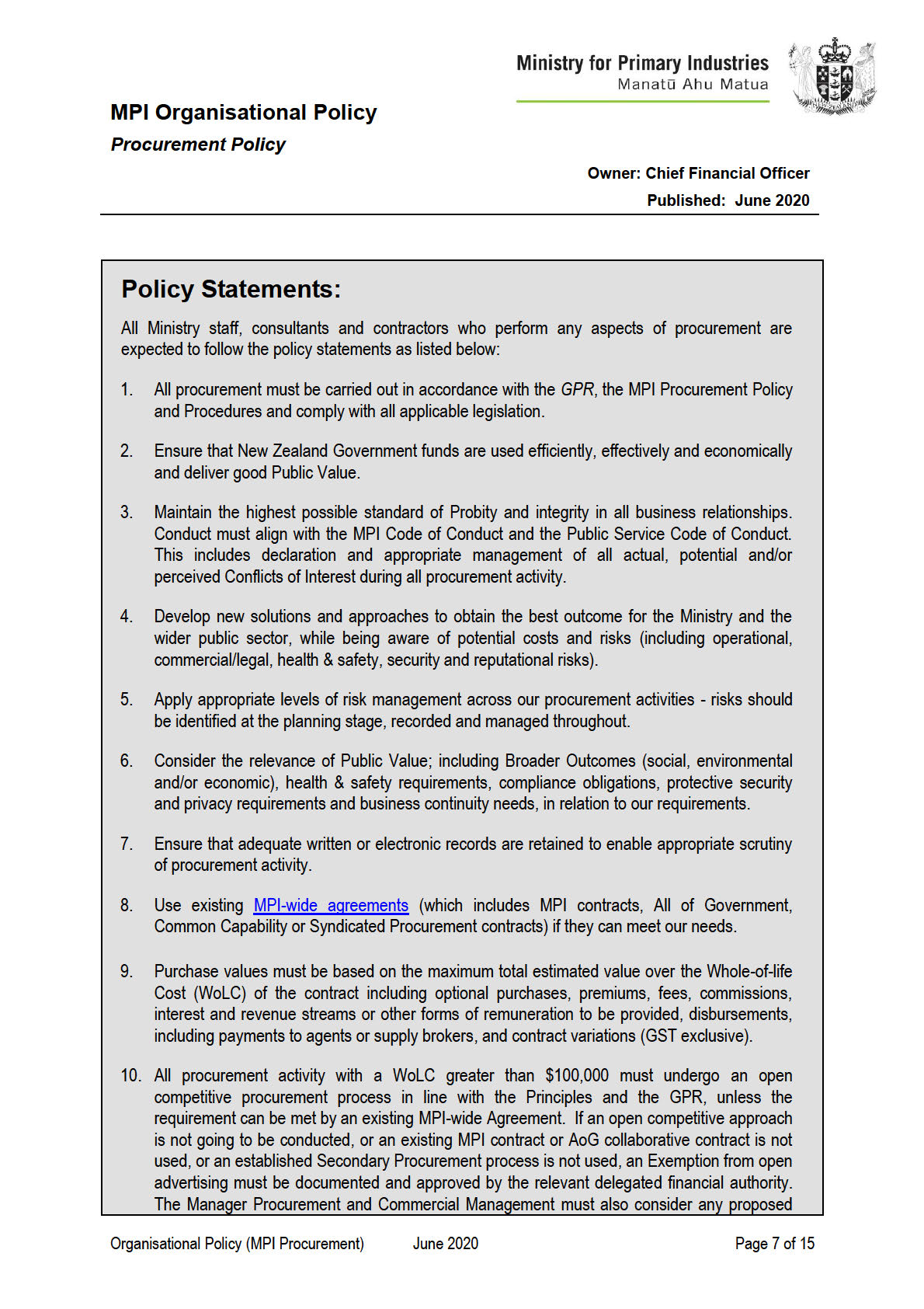
ACT 1982
INFORMATION
RELEASED UNDER THE OFFICIAL
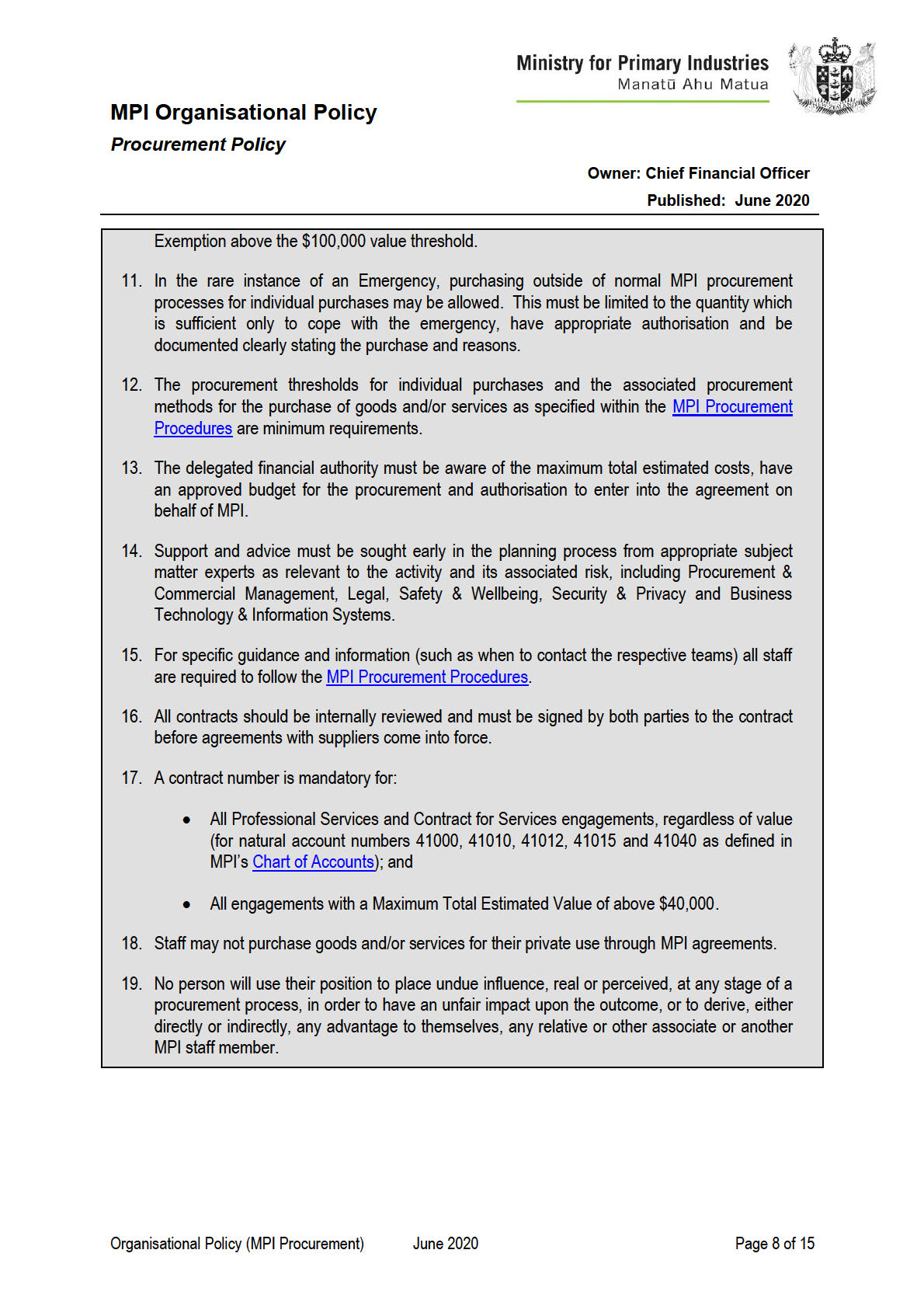
ACT 1982
INFORMATION
RELEASED UNDER THE OFFICIAL
 MPI Organisational Policy
Procurement Policy
Owner: Chief Financial Officer
Published: June 2020
KEY ACCOUNTABILITIES
MPI Organisational Policy
Procurement Policy
Owner: Chief Financial Officer
Published: June 2020
KEY ACCOUNTABILITIES
The following roles have specific responsibilities under this policy:
ACT 1982
Chief Financial Officer (CFO)
The CFO is responsible for setting and maintaining MPI’s Procurement policy, procedures and guidelines
and reporting to the Senior Leadership team (SLT) on the policy where necessary
Managers
All Managers are accountable for:
understanding and complying with the responsibilities and limits of their own delegated financial
authority;
INFORMATION
ensuring staf , and all people working in their team, are familiar and comply with this procurement
policy;
ensuring that Contract Managers are assigned to all contracts managed within their teams, and
ensuring Contract Managers understand and undertake their contract management responsibilities;
planning, management and outcomes of all procurement activity within their business unit; and
risks (including operational, commercial, financial, health & safety and reputational), benefits and
overall performance of all contracts managed appropriately within their business unit.
Contract Managers
All Contract Managers are responsible for ensuring contracts are managed appropriately over their life,
including:
tracking and monitoring performance (including managing performance issues), reporting, delivery
and deliverable/milestone progress;
financial monitoring, including validation and approval of invoices, and tracking spend against
contract value;
identifying and managing risks associated with the contract (including operational, commercial,
financial, health & safety and reputational);
RELEASED UNDER THE OFFICIAL
identifying areas of improvement; and
developing and maintaining trusted and robust relationships with suppliers, conducting reviews and
resolving problems.
Organisational Policy (MPI Procurement)
June 2020
Page 9 of 15
 MPI Organisational Policy
Procurement Policy
Owner: Chief Financial Officer
Published: June 2020
All Ministry staff, contractors and consultants
MPI Organisational Policy
Procurement Policy
Owner: Chief Financial Officer
Published: June 2020
All Ministry staff, contractors and consultants
All MPI staff, contractors and consultants involved in procurement activities are responsible for:
ensuring they understand, comply with, and consistently apply the procurement policy and
associated procedures and guidelines when procuring goods and/or services in the course of their
duties;
obtaining support and advice early in the process from appropriate subject matter experts as
ACT 1982
relevant to the activity and its associated risk, including the Procurement & Commercial
Management, Legal, Safety & Wellbeing, Security & Privacy and Business Technology &
Information Systems;
ensuring that New Zealand government’s funds are used efficiently, effectively and economically
and deliver good Public Value;
except for engagement of consultants and contractors, their own purchasing arrangements up to
$100,000 in value and managing them accordingly;
for engagement of consultants and contractors, their own purchasing arrangements up to $40,000
INFORMATION
in value and managing them accordingly;
requesting a contract number from the Procurement and Commercial Management Team for all
Professional Services and Contract for Services engagements, regardless of value (for natural
account codes 41000, 41010, 41012, 41015 and 41040 as defined in MPI’s Chart of Accounts),
and for all other engagements with a Maximum Total Estimated Value of over $40,000;
providing the Procurement and Commercial Management Team with a scanned copy of the signed
contract following a procurement;
declaring any actual, potential or perceived conflicts of interest in accordance with MPI’s Conflict of
Interest Guidelines; and
conducting reasonable due diligence (both prior to, and during the contract period).
Procurement and Commercial Management Team
MPI’s Procurement and Commercial Management Team are responsible for:
considering all proposed Exemption requests above the $100,000 value threshold, and providing
advice on whether the exemption to MPI’s Procurement Policy is supported;
leading the procurement sourcing strategy and process for all consultants and contractor services
over $40,000 and for all other procurement activity over $100,000;
providing contract numbers by registering contracts in a centralised database and holding a copy of
the contract;
RELEASED UNDER THE OFFICIAL
providing professional procurement expertise, advice/assistance to the business when needed;
providing training to staff in relation to all phases of the procurement lifecycle;
maintaining and updating associated guidelines, procedures and templates so that they remain fit
for purpose; and
Organisational Policy (MPI Procurement)
June 2020
Page 10 of 15
 MPI Organisational Policy
Procurement Policy
Owner: Chief Financial Officer
Published: June 2020
MPI Organisational Policy
Procurement Policy
Owner: Chief Financial Officer
Published: June 2020
developing and maintaining key internal relationships to assist with delivering commercial
management within MPI.
MANDATORY PROCEDURES
MPI staff that need to undertake a procurement activity are required to follow the procurement procedures
set out below:
ACT 1982
MPI Procurement Procedures
Recruitment, Contractor & Consultant Guidelines
FURTHER GUIDANCE and INFORMATION
Business Units undertaking procurement activity must consider any legal or Treaty related obligations
and accords and consult with interested parties and/or relevant subject matter experts (both internal and
INFORMATION
external) where necessary.
Related Policies, procedures and guidance:
MPI Policy
o Code of Conduct
o Asset Management and Disposal Policy
o External Sponsorships
o Grants Schemes Policy
o Information Management Policy
o Risk Management Policy
o HR & Finance Delegations (Delegations)
o Motor Vehicle Policy
o Sensitive Expenditure Policy
o Purchase Card Policy
Government Requirements
o Government Procurement Rules 2019 (4th Edition)
o Government Procurement Principles
o Government Procurement Charter
o Government Good Practice Guides
o Good Practice Procurement Guide for Improving Health and Safety
RELEASED UNDER THE OFFICIAL
MPI Guidelines
o MPI Guidelines Managing Intel ectual Property
o Guidelines for the treatment of Intel ectual Property Rights in ICT contracts
o Conflict of Interest
o Motor Vehicle Guidelines
o Sensitive Expenditure Guidelines
Organisational Policy (MPI Procurement)
June 2020
Page 11 of 15
 MPI Organisational Policy
Procurement Policy
Owner: Chief Financial Officer
Published: June 2020
MPI Organisational Policy
Procurement Policy
Owner: Chief Financial Officer
Published: June 2020
o Dealing with Misconduct Guidelines
o Information Gathering and Public Trust Guidelines
o Our IT Guidelines
o Guideline for managing health and safety risk in contracting
Legislation
o Public Finance Act 1989
ACT 1982
o Commerce Act 1986
o Health & Safety at Work Act 2015
o Privacy Act 1992
o Public Records Act 2005
o Of icial Information Act 1982
INFORMATION
RELEASED UNDER THE OFFICIAL
Organisational Policy (MPI Procurement)
June 2020
Page 12 of 15
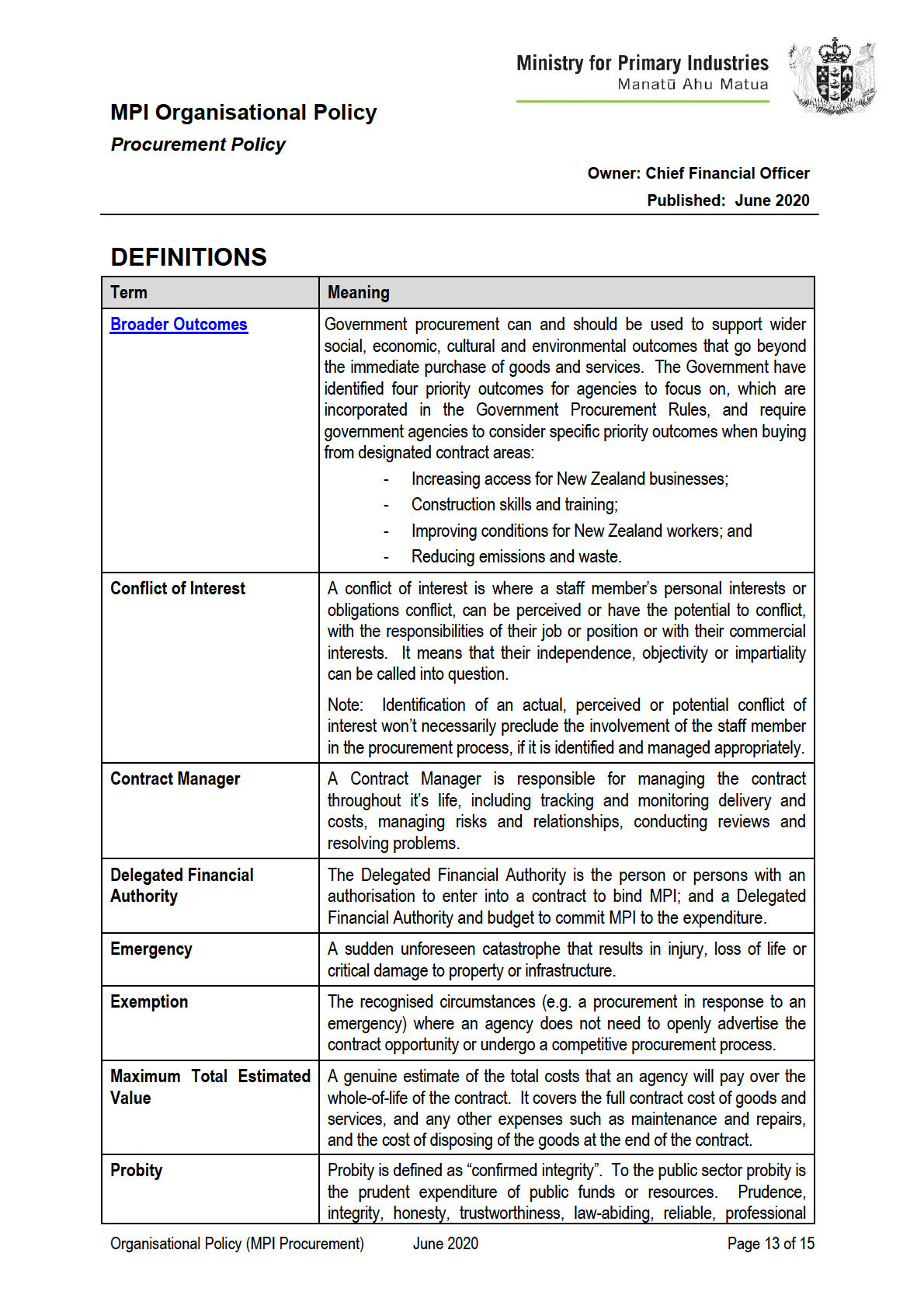
ACT 1982
INFORMATION
RELEASED UNDER THE OFFICIAL
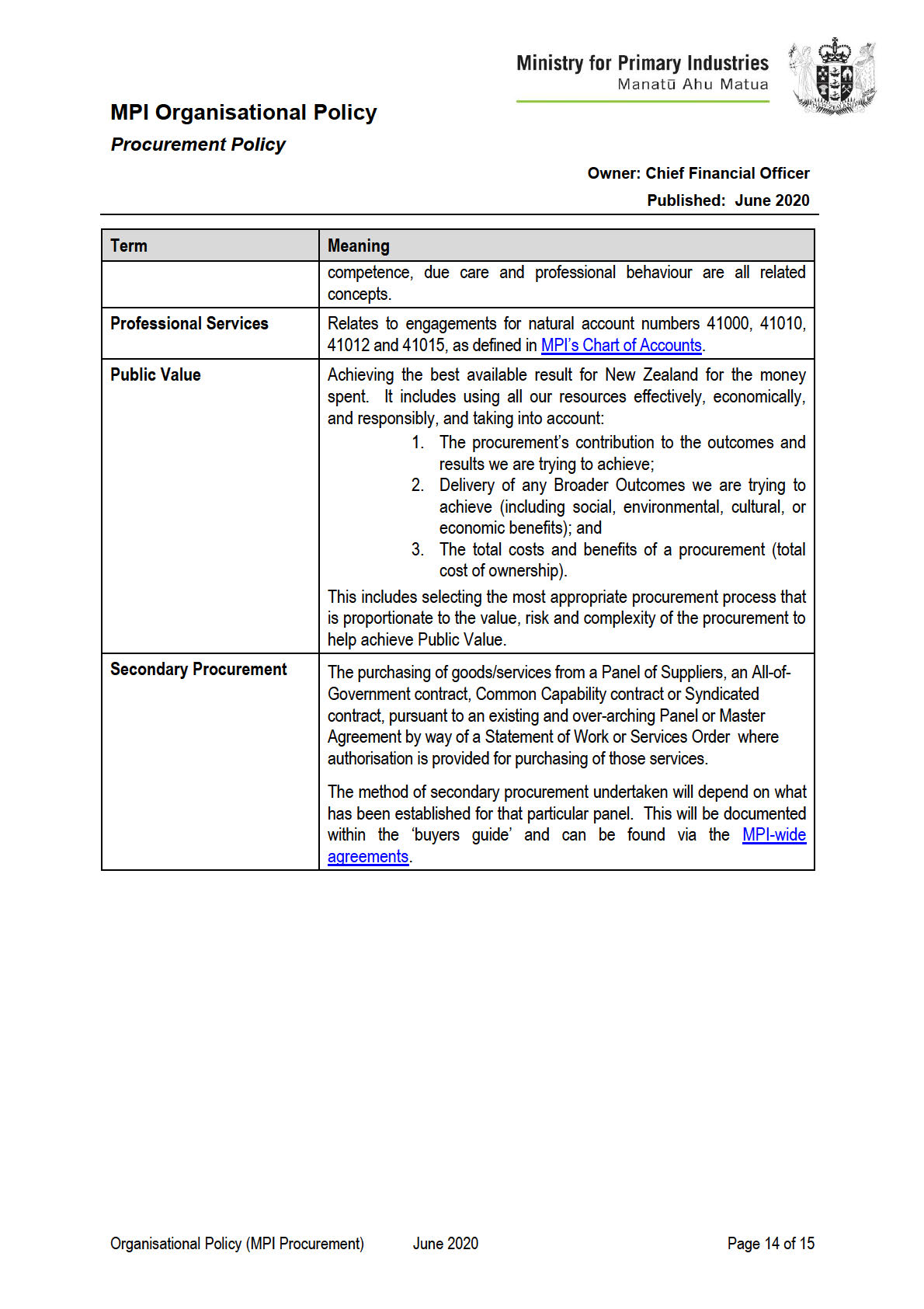
ACT 1982
INFORMATION
RELEASED UNDER THE OFFICIAL
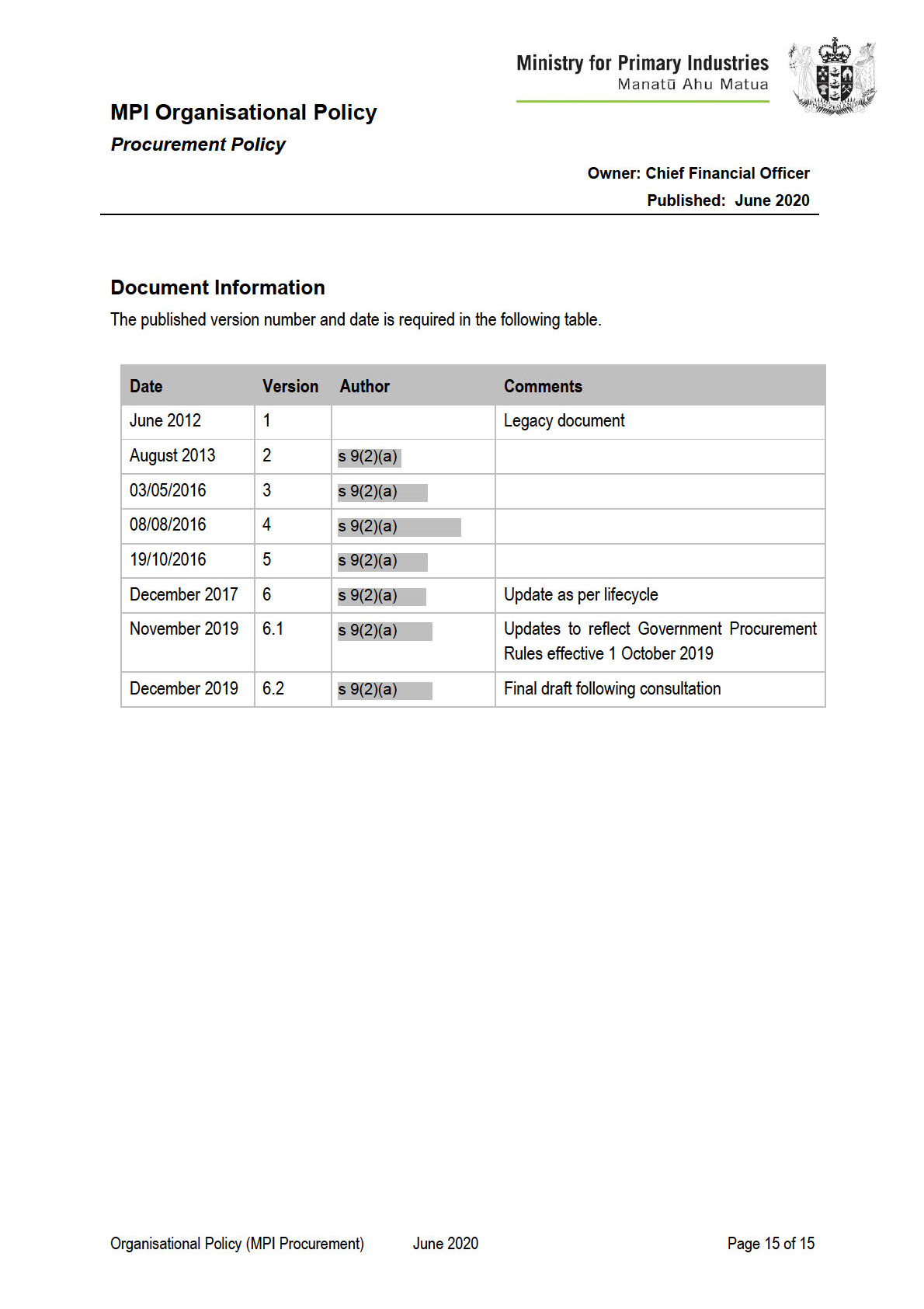
ACT 1982
INFORMATION
RELEASED UNDER THE OFFICIAL















